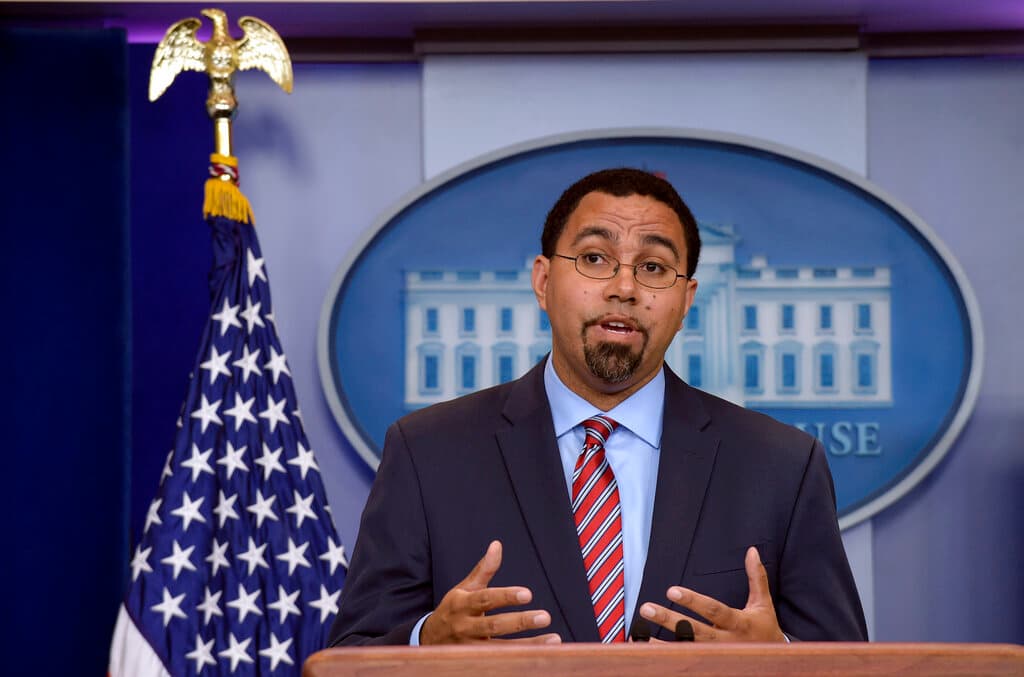Are Liberal Education Policies Undermining Minorities They’re Intended To Help?
The question is before the Supreme Court — and the new chancellor of New York’s state university system.

Almost 40 years ago, I produced a public television film entitled “America’s First School,” which told the story, through alumni interviews, of the Boston Latin School, the nation’s oldest public high school.
It had evolved to become an elite entrance exam-based high school like New York’s Stuyvesant or San Francisco’s Lowell. It’s caught up today in the same controversy dogging all such schools, the “under-representation” of African-Americans.
It comes to mind on the occasion of the appointment of the former Obama administration secretary of education, John King, as chancellor of the 62-campus system of the State University of New York.
Mr. King has long focused on the so-called achievement gap for African-American students and chose to emphasize it again on the occasion of his appointment. One interviewee in my film did so, as well — but in a way that would now be considered unfashionable, to say the least, and at odds with Mr. King’s views on the underlying problem in a way that merits reflection.
It should first be said that the King choice is basically a good one. His background includes founding a successful Boston charter school and leading the charter school network Uncommon Schools.
“I have a long history of supporting good charter schools and not supporting bad charter schools,” Mr. King said. That’s as strong an endorsement of the concept by a public official one is likely to hear.
As New York State’s education commissioner, Mr. King ran afoul of teachers unions for his support of the so-called common core curriculum for public schools, the abortive Obama-backed effort to install more demanding subject matter and related student and teacher testing at the K-12 level. Whatever the merits of that controversial plan, Mr. King made the right enemies — and was willing to do so.
As SUNY chancellor he’ll be in a position to help choose new state-authorized charter school operators — and, one can hope, push the idea of lifting New York city’s current charter school cap. Many have been the very schools which have narrowed or even eliminated the learning gap between the races.
Mr. King, though, has frequently offered an analysis of the situation of Black students that merits reflection. In a speech at Georgetown University, he observed that “for students of color, disparities in educational opportunity and achievement are inextricably linked to our nation’s continued struggle to grapple with issues of race and bias.”
Mr. King added that it was America’s “legacy of slavery and the imposition of segregation that first made the education of black people a punishable offense and then established a separate, inferior system of schools for black children.”
There is no doubt about the history Mr. King cites and its lingering ill effects. Nonetheless, as experienced and sophisticated an educator as Mr. King surely knows there is more to the story, including the teachers unions with whom he’s tangled.
To those complications one hopes that he might add the legacy not just of racism but of the effort to undo it known as affirmative action. In my film, a Black Latin School alumnus, who had gone on to a successful journalism career, tells the story of a teacher who, concerned that his student was not achieving his potential, takes him aside.
“Don’t you know you have to be twice as good,” the teacher tells him. It is shocking to hear and says much about the racial atmosphere of early 1960s Boston. Nonetheless, the alum confides that he’d been both angered by the comment — and motivated by it.
The alumnus’ response suggests that there is more to the gap that so rightly concerns Mr. King than the Jim Crow past. It is the question of whether proposals such as that floated to drop the entrance exam for New York’s examination-based high schools or race-conscious college admission policies generally might be sending a message that perpetuates the achievement gap rather than helping to correct it.
Severing the connection between effort and achievement risks discouraging both. One struggles to understand the racial achievement gap otherwise in cities such as Shaker Heights, Ohio, where, the Washington Post reports, the gap persists even in an upper-middle-class community.
As the Supreme Court prepares to rule on whether affirmative action in elite university admissions has harmed Asians, it is time to consider whether it has undermined those it was intended to help. On this question, Mr. King, himself a Harvard College graduate, will be in a position to influence state policies and guide public opinion.

